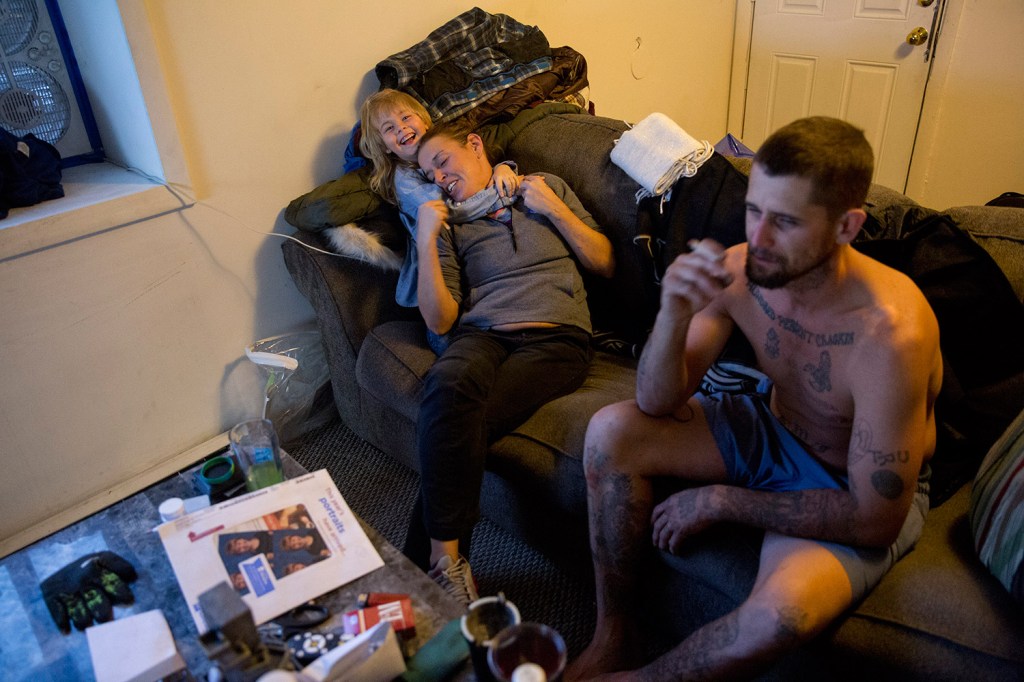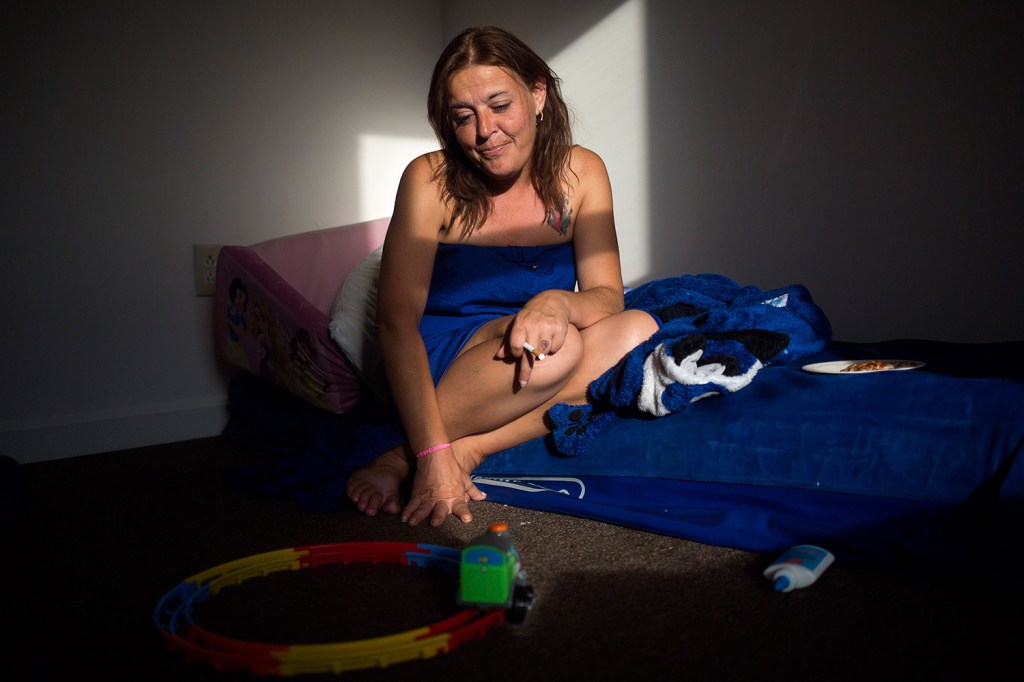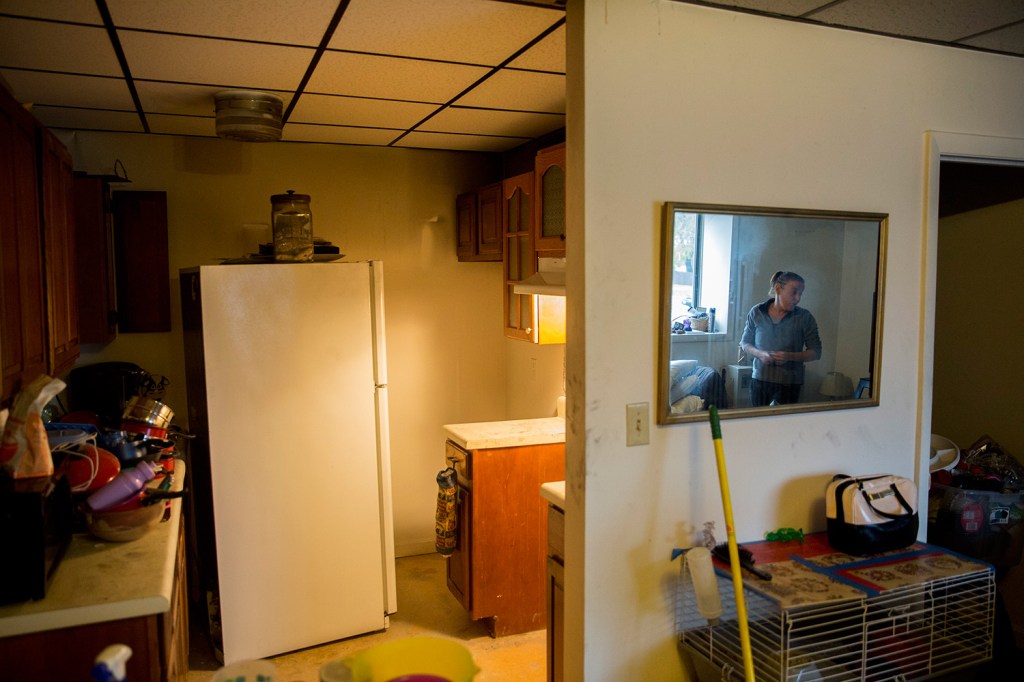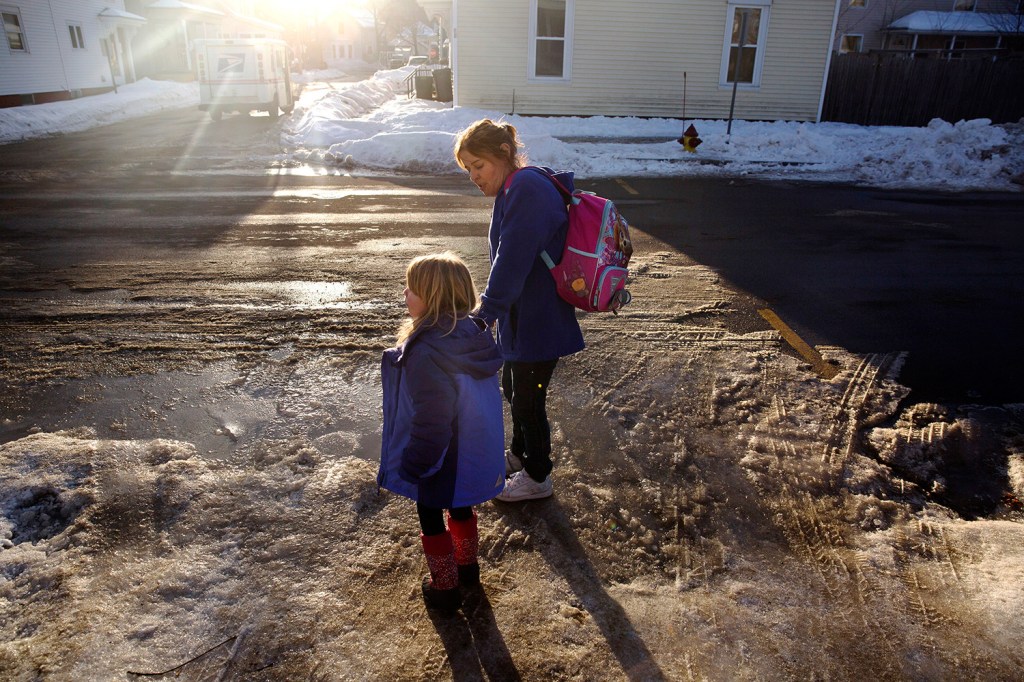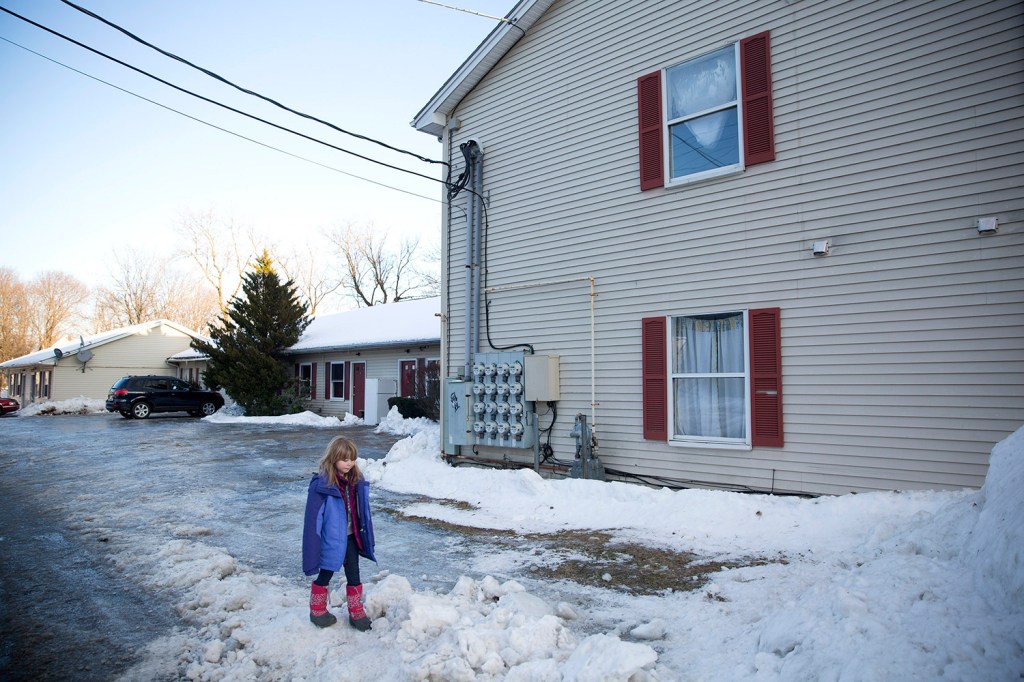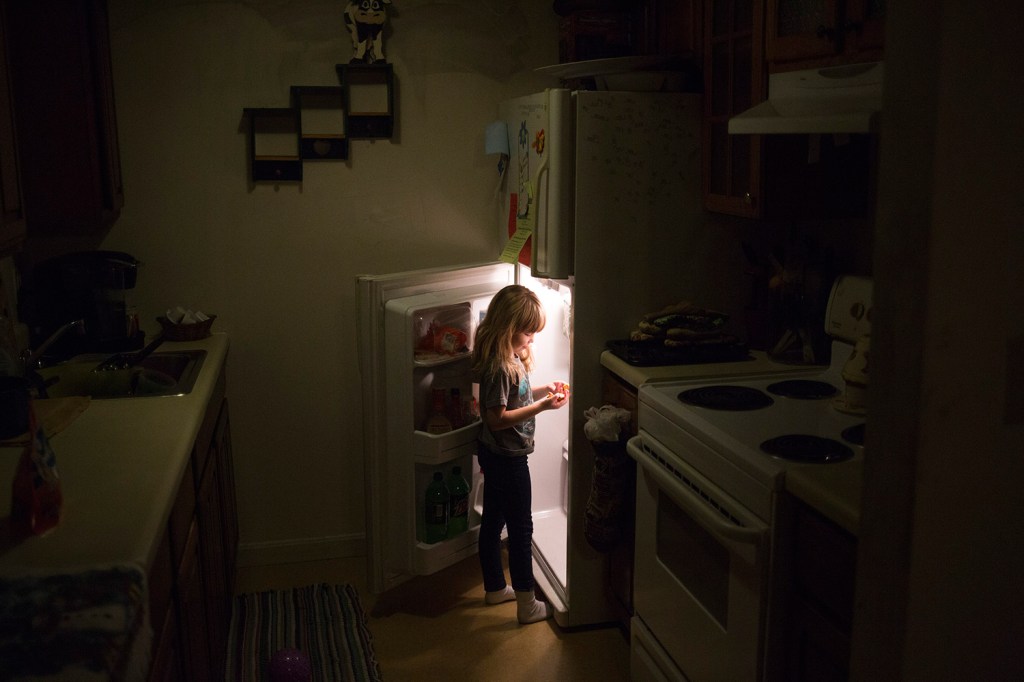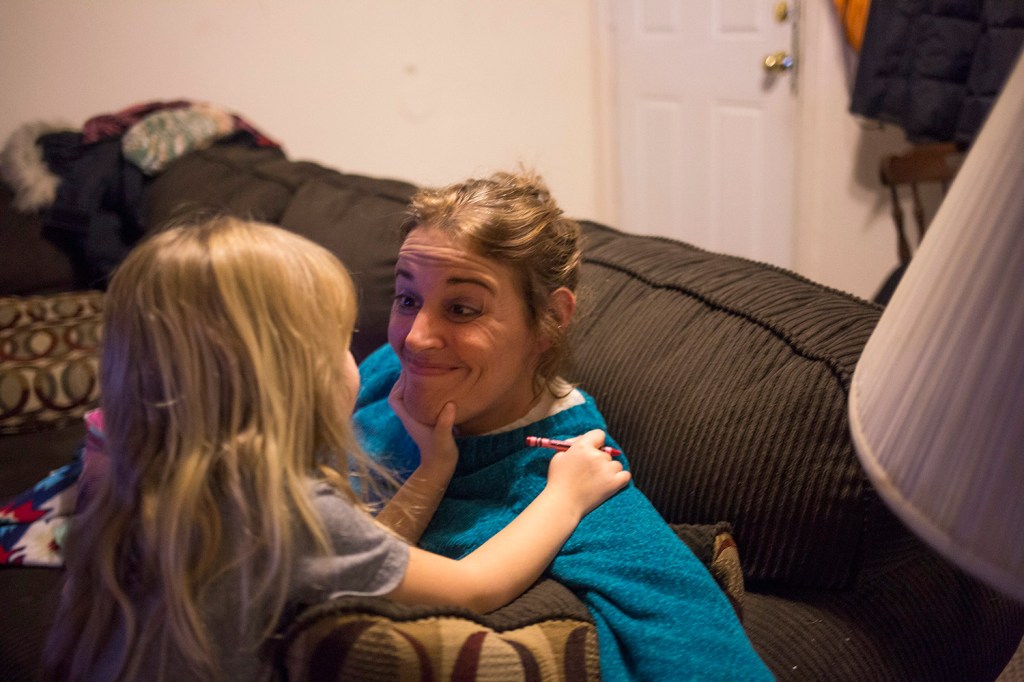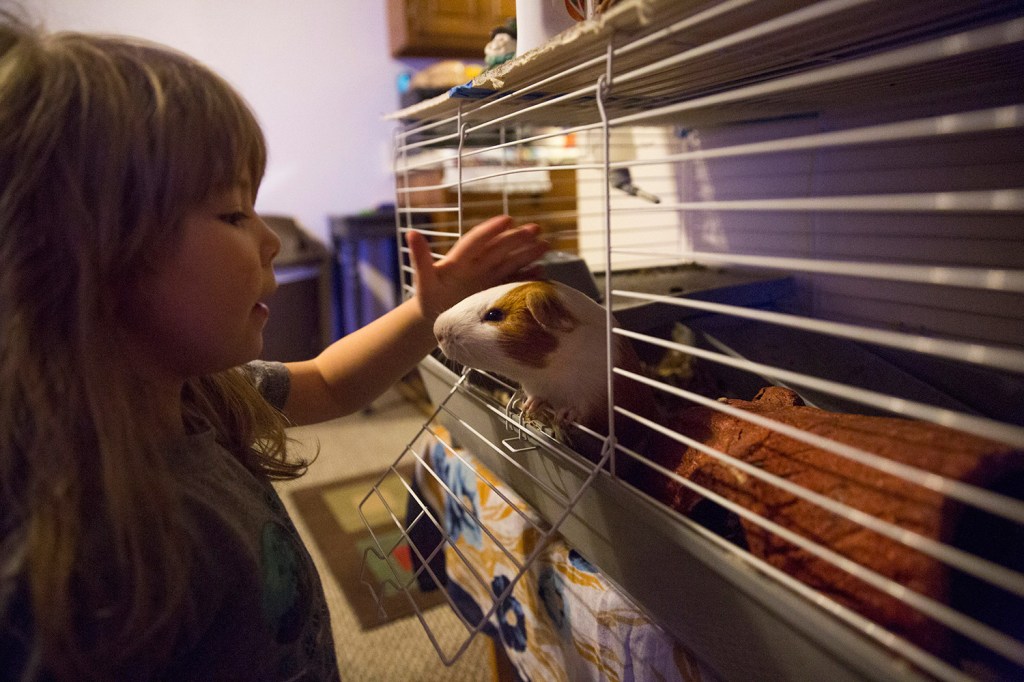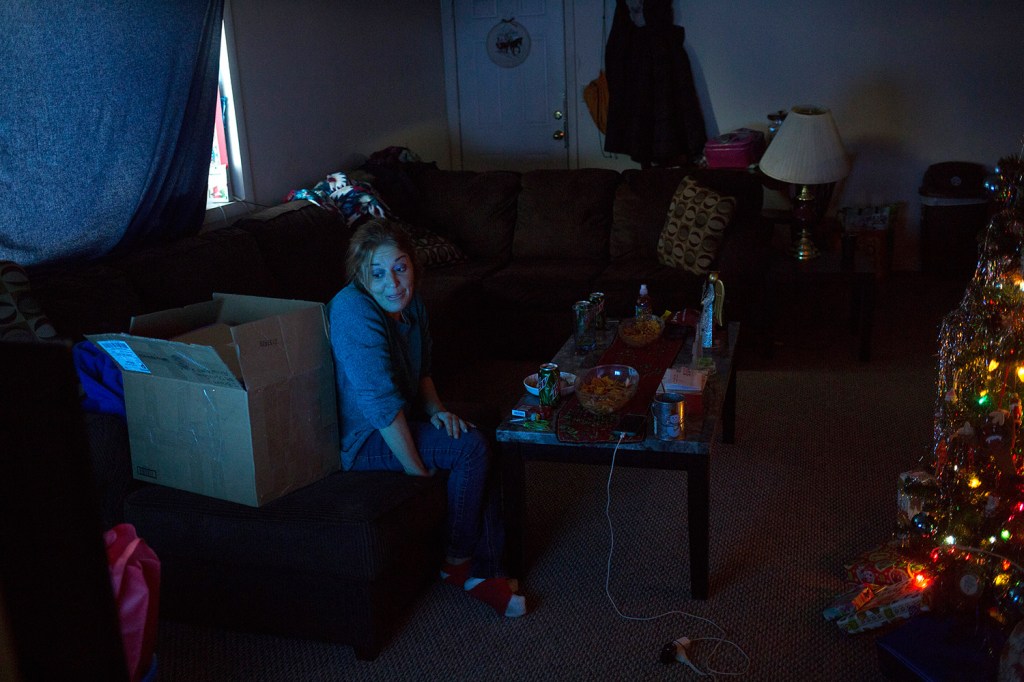AUBURN — A wave of heat greets 5-year-old Arianna as she bursts through the door of her family’s apartment. It’s a welcome embrace after a 10-minute walk home from school on icy sidewalks in 30-degree weather.
The little girl may have never seen snow before moving from Florida to Maine in July, but she seems to be adjusting. Arianna repeatedly ate handfuls of snow on the walk home, and scaled snowbanks so she could slide down in her jeans.
Arianna’s family has been living in this Auburn apartment for five months after spending weeks in a homeless encampment in the woods behind a Portland shopping center.
The family’s life has stabilized since their story – chronicled in a Maine Sunday Telegram report in September – sparked generosity from strangers and inspired efforts to reform anti-poverty programs locally and nationally. Arianna is thriving in kindergarten. Her parents are working.
But while literally out of the woods, they are still working to be financially secure and settle into their new lives in Maine.
Inside the warm apartment, Arianna drops her oversized backpack just beyond the threshold. She wiggles free of two winter coats, letting them fall to the floor. The snow flakes off her pants as she runs by the small kitchen table and curls around the arm of an overstuffed couch and into the living room. The colored lights of the family’s Christmas tree cast a warm glow throughout the apartment.
Arianna inspects the presents underneath the Christmas tree. She finds a letter which her mom, Chrissy, says is from Santa Claus, who wrote to tell Arianna if she made the naughty or nice list. The 5-year-old girl tears open the envelope and hands it to her mother. “Am I really good?” Arianna asks. Chrissy nods her head. “Yes? Yay!” says Arianna, jumping up and down.
She picks at a sheet of stickers depicting Santa’s workshop that came with the letter and begins removing them. She accidentally rips one. “Sorry, Santa,” she says.
LEAVING TENT CITY
This scene is a stark contrast to this past summer, when the family was homeless, living in a tent in a patch of urban woods.
Seeking a new start away from the destructive influence of drugs and unhealthy relationships, Chrissy Chavez, now 39, and her boyfriend, Troy Jethro, now 35, brought Arianna from Florida to Maine. But their jobs and apartment fell through after they arrived, leaving the family with few options. After a few nights at Portland’s family shelter, they were kicked out for not following the rules. They took up residence in a homeless encampment behind Lowe’s Shopping Center on Brighton Avenue with about two dozen other campers.
Arianna’s presence in the encampment drew attention after Portland police moved to evict the campers from the privately owned land. A state caseworker and others tried to help, but the family ran into a series of obstacles as they looked for an apartment. Still uncertain they would have an apartment to move into, they packed out of the “Tent City” on the same day police were issuing trespass warnings to the remaining campers. They finally got a modest two-bedroom place in Auburn and moved in with their few belongings – a couple of tents, a pile of blankets, a lawn chair and a military cot.
After their story was published in the Maine Sunday Telegram, the family received a flood of offers to help. Most people wanted to provide clothing, books and toys to Arianna.
Now their apartment is filled with the everyday luxuries that many take for granted. Furniture, pots, pans, dishes, a flat-screen television, beds and dressers. Arianna’s bedroom already overflowed with new toys and clothes days before Christmas.
The story about the family’s struggle also had broader impacts.
U.S. Sen. Susan Collins referenced the family’s struggle while introducing an anti-poverty bill on the floor of the U.S. Senate. She stood in front of an enlarged photo of the captivating young girl looking confused in front of a red tent. Back in Maine, city officials in Portland secured more overflow space for the shelter system, so women and children would no longer have to sit in hard plastic chairs all night when beds are not available.
The family had been kicked out of the shelter after Troy videotaped the conditions, which was not allowed because of privacy safeguards. The extra space also was added after Chrissy attended a City Council meeting to complain about conditions in the shelter. And a South Portland-based social service agency, the Opportunity Alliance, used the family’s story as the subject of its annual retreat for its board of directors in December, as it looked for ways to play a bigger role in helping families escape poverty and homelessness.
The family’s fall into the state’s safety net program this past summer was anything but smooth. Now, Chrissy says, state officials in Augusta also are reviewing their case file to figure out how several mistakes were made. Among the hiccups, as she calls them, was being denied food stamps last summer because officials falsely believed that Troy had been convicted of fraud. And they had trouble getting Arianna on MaineCare, or Medicaid, because she was mistakenly believed to be an adult.
A spokeswoman at the Maine Department of Health and Human Services would not confirm that the family’s case was being reviewed, citing confidentiality rules.
Although the family was flooded with offers to help and was grateful for support, Chrissy says they turned down many of the donations. There are only so many dishes, pots, pans, silverware, couches, chairs and bureaus one family needs, she said.
“I think I was overwhelmed,” Chrissy said. “We didn’t want to be greedy when there are other people out there who need help.”
HARDLY SMOOTH SAILING
One reader began an online fundraising page for the family. Chrissy said they used about $800 raised online and bought a car – a 2002 Lincoln that needs new brakes. Before it’s roadworthy, it needs to be inspected and registered. Chrissy and Troy also need to get their driver’s licenses. Troy says for him that means paying thousands of dollars in outstanding fines and restitution that he racked up while addicted to drugs back in Florida. After serving a three-year sentence for a felony drug conviction, he came to Maine to get clean and Chrissy says he’s been sober for nine months.
Getting the car on the road and being legally allowed to drive it could make their lives much easier and more stable.
Troy has been catching rides to Bath, where a temporary employment agency found him a job working as a laborer for a building company. He wakes up at 4:30 a.m. and is usually home a little after 5 p.m. But on this night, he was delayed because the driver had to work late.
Troy says his boss has offered to hire him as a permanent employee as soon as he has reliable transportation. That would provide the family with benefits, he says.
Despite their turn of fortune, it’s hardly been smooth sailing for the family.
Chrissy said they almost got evicted from their apartment shortly after moving in because of a glitch with their housing voucher. The Bridging Rental Assistance Program requires clients to pay 51 percent of their income, while the state pays the rest. Chrissy said they paid their share for the first two months, but the state did not. Again, their state case manager intervened until the issue was resolved, she said. Then, on Nov. 2, a crock pot donated to the family caught fire, causing significant damage to the kitchen and smoke damage throughout the house. Chrissy was cooking chili and had just returned from an errand when she saw the fire. She said she put it out before the fire department arrived, although she went to the hospital to be treated for smoke inhalation.
“I was not losing this house,” she said.
‘DINNER IS SERVED’
Arianna sits on the floor emptying her Paw Patrol-themed backpack. It’s filled with crafts made at school, including ornaments with her pictures on them. “That’s me,” she says proudly, showing it to the room.
Around 7:30 p.m., Troy walks in the door, tosses a frozen pizza on the table and begins peeling off layers of jackets and shirts. He takes off his boots, which are not waterproof. He’s wearing plastic bags over two pairs of socks.
Both he and Arianna enjoyed the first few snowstorms – neither had experienced snow before coming to Maine. But Troy has hardened to Maine’s winter weather now that he works outside all day, climbing on roofs, putting up siding and building decks. “It was great until I had to stand in snow all day with frozen feet,” Troy says. “My toes feel like they’re going to fall off at the end of the day.”
Now that Troy makes $14 an hour at his current job, the family no longer uses a voucher to pay for their $750-a-month apartment, nor do they need Temporary Assistance for Needy Families, they say.
Chrissy expects that soon after she starts working at her new job as a customer service representative at a local marketing firm, the family will no longer need food stamps or MaineCare. After the new year, Arianna is planning to join the Girl Scouts.
By 8:30 p.m., the pizza is ready. Troy brings it over to the living room table, using the flattened box as a serving platter. “Dinner is served,” he says.
Comments are not available on this story.
Send questions/comments to the editors.


